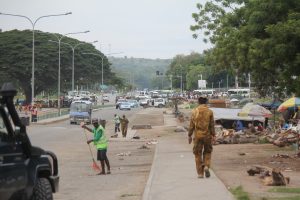On January 12, Papua New Guinea (PNG) Prime Minister James Marape declared a 14-day state of emergency, in response to violent riots. The move raises critical questions about the balance between maintaining public order and upholding civil liberties.
The state of emergency declaration was the Marape government’s reaction to serious public disorder that erupted on January 10. At 2 p.m. that day – since dubbed “Black Wednesday” by locals – PNG’s police and defense forces announced on social media that they had “withdrawn their services” following additional salary deductions that were, in their view, unsatisfactorily explained.
This sudden law enforcement vacuum meant that the political instability – already growing due to the looming February 2024 expiry of an 18-month post-election ban on votes of no confidence – reached a critical mass. Both government opponents and disgruntled state employees, amplified by social media communications, triggered quickly escalating public disorder that ultimately saw some of the worst violence ever seen in PNG in the capital and other urban centers. Only the deployment of the army the same evening restored a degree of calm, but this was too late to prevent more than 20 fatalities and widespread arson damage.
Marape’s declaration of a 14-day state of emergency has enabled him to remove the Royal Papua New Guinea Constabulary’s Police Commissioner and other key staff and install new leadership to oversee an investigation into the causes of the disorder and to restore calm. The army and police are empowered to maintain public order and no gatherings or protests are permitted. This is fortuitous timing for the prime minister, as opposition groups expected to take advantage of expiring restrictions on no confidence votes will now have no ability to assemble or protest.
While Section X of PNG’s Constitution permits these measures – they have been implemented multiple times previously on a regional basis during tribal wars – they undoubtedly impact the internationally recognized civil and political rights of PNG’s populace, to whom Marape and his ministers are accountable. International law, particularly the International Covenant on Civil and Political Rights (ICCPR), permits states to deviate from certain obligations during states of emergency, but this is conditional upon any measures being necessary, proportionate, and non-discriminatory. The United Nations Human Rights Committee (UNHRC) provides guidelines on these exceptions, emphasizing the importance of maintaining fundamental rights.
PNG’s Constitution allows for emergency measures, as seen in Section X, but these too must adhere to principles of necessity, proportionality, and legality. The PNG judiciary, like its counterparts in other common law countries, plays a critical role in overseeing the implementation of such measures and safeguarding constitutional rights.
At the time of writing, PNG’s state of emergency has been described by Marape as being “soft,” perhaps meaning that not all the powers available under the constitution will ultimately be deployed. Curfews and expanded stop, search, and detain rules have so far not been implemented. The rights to assembly and to protest are, however, currently suspended.
Social media use is being monitored and the threat of a civilian internet shutdown remains a real possibility. PNG has a strict cybercrime framework, with many cases of successful prosecutions in 2023 for defamation via social media and other online offenses.
International entities, including the United Nations, regional organizations such as the Pacific Islands Association of NGOs (PIANGO), and the media often scrutinize states of emergency to ensure compliance with international human rights standards. PNG is no exception, and the initial reactions from these entities have so far been largely supportive.
China, however, has “sternly warned” that more needs to be done to protect Chinese citizens in PNG, as expatriate Chinese nationals have suffered disproportionately in the public order breakdown. Whether “doing more” invites greater Australian participation, considering the Australia-PNG security agreement, remains to be seen.
The state of emergency in Papua New Guinea underscores the complex challenge of balancing public order with civil liberties. While the government’s primary duty is to ensure safety and order, this must not come at the expense of fundamental human rights. The international community, local judiciary, civil society, and international media play crucial roles in maintaining this balance.
As PNG navigates this challenging period, it serves as a real-time case study for the world on managing crises within the framework of democratic norms and international human rights standards. The lessons learned here will be pivotal for future governance and crisis management strategies, both within PNG and in other nations facing similar challenges.
































